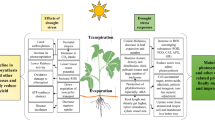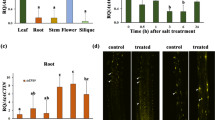Abstract
Drought stress is a severe environmental factor that greatly restricts plant distribution and crop production. Transgenic breeding offers new opportunities for developing drought-resistant varieties. The WRKY transcription factors have been reported to be involved in various plant physiological and biochemical processes. In this study, we report the impact of TaWRKY46 on abiotic tolerance in wheat (Triticum aestivum L.). The transcription levels of the TaWRKY46 gene were differentially regulated by diverse abiotic stresses and hormone treatments, including PEG-induced stress (20% polyethylene glycol 6000), cold (4 °C), salt (100 mM NaCl), abscisic acid (100 μM ABA) and hydrogen peroxide (10 mM H2O2). The TaWRKY46-GFP fusion protein was localized to the nucleus of wheat protoplast. The N-terminal of TaWRKY46 showed transcriptional activation activity. Overexpression of TaWRKY46 in wheat resulted in enhanced drought stress tolerance. TaWRKY46-overexpressing plants exhibited increase survival rate, soluble sugar, proline and superoxide dismutase (SOD), as well as higher activities of catalase (CAT) and peroxidase (POD), but lower contents of malondialdehyde (MDA) and H2O2 content. Taken together, our results indicate that TaWRKY46 functions as a positive factor under drought stress by regulating the osmotic balance and ROS scavenging.





Similar content being viewed by others
References
Abrahám E, Rigó G, Székely G, Nagy R, Koncz C, Szabados L (2003) Light-dependent induction of proline biosynthesis by abscisic acid and salt stress is inhibited by brassinosteroid in Arabidopsis. Plant Mol Biol 51:363–372
Bechtold U, Field B (2018) Molecular mechanisms controlling plant growth during abiotic stress. J Exp Bot 69:2753–2758
Chen W, Zhu T (2004) Networks of transcription factors with roles in environmental stress response. Trends Plant Sci 9:591–596
Chen L, Yu S, Li S, Zhang L, Zou C, Yu D (2012) The role of WRKY transcription factors in plant abiotic stresses. Acta Biochim Biophys Sin 1819:121–128
Chi Y, Yang Y, Zhou Y, Jie Z, Fan B, Yu J, Chen Z (2013) Protein-protein interactions in the regulation of WRKY transcription factors. Mol Plant 6:287–300
Eulgem T, Rushton PJ, Robatzek S, Somssich IE (2000) The WRKY superfamily of plant transcription factors. Trends Plant Sci 5:199–206
Jiang Y, Qiu Y, Hu Y, Yu Q (2016) Heterologous expression of AtWRKY57 confers drought tolerance in Oryza sativa. Front Plant Sci 7:154
Ju Y, Yue X, Zhao M, Wang X, Fang Y, Zhang J (2020) VvNAC17, a novel stress-responsive grapevine (Vitis vinifera L.) NAC transcription factor, increases sensitivity to abscisic acid and enhances salinity, freezing, and drought tolerance in transgenic Arabidopsis. Plant Physiol Biochem 146:98–111
Niu C, Wei W, Zhou Q, Tian A, Chen S (2012) Wheat WRKY genes TaWRKY2 and TaWRKY19 regulate abiotic stress tolerance in transgenic Arabidopsis plants. Plant Cell Environ 35:1156–1170
Rushton PJ, Somssich IE, Ringler P, Shen Q (2010) WRKY transcription factors. Trends Plant Sci 15:247–258
Skriver K, Mundy J (1990) Gene expression in response to abscisic acid and osmotic stress. Plant Cell 2:503–512
Tripathi P, Rabara RC, Rushton P (2014) A systems biology perspective on the role of WRKY transcription factors in drought responses in plants. Planta 239:255–266
Ulker B, Somssich IE (2004) WRKY transcription factors: from DNA binding towards biological function. Curr Opin Plant Biol 7:491–498
Wang F, Hou X, Tang J, Wang Z, Wang S, Jiang F, Ying L (2012) A novel cold-inducible gene from Pak-choi (Brassica campestris ssp. chinensis), BcWRKY46, enhances the cold, salt and dehydration stress tolerance in transgenic tobacco. Mol Biol Rep 39:4553–4564
Wang C, Deng P, Chen L, Wang X, Ma H, Hu W, Yao N, Feng Y, Chai R, Yang G, He G (2013) A wheat WRKY transcription factor TaWRKY10 confers tolerance to multiple abiotic stresses in transgenic tobacco. PLoS ONE 8:e65120
Wang C, Ru J, Liu Y, Li M, Zhao D, Yang J, Fu J, Xu Z (2018) Maize WRKY transcription factor ZmWRKY106 confers drought and heat tolerance in transgenic plants. Int J Mol Sci 19:3046
Wu X, Shiroto Y, Kishitani S, Ito Y, Toriyama K (2009) Enhanced heat and drought tolerance in transgenic rice seedlings overexpressing OsWRKY11 under the control of HSP101 promoter. Plant Cell Rep 28:21–30
Xiong X, James VA, Zhang H, Altpeter F (2010) Constitutive expression of the barley HvWRKY38 transcription factor enhances drought tolerance in turf and forage grass (Paspalumnotatum Flugge). Mol Breed 25:419–432
Xu Q, Feng W, Peng H, Ni Z, Sun Q (2014) TaWRKY71, a WRKY transcription factor from wheat, enhances tolerance to abiotic stress in transgenic Arabidopsis thaliana. Cereal Res Commun 42:47–57
Zhang L, Zhao G, Jia J, Liu X, Kong X (2012) Molecular characterization of 60 isolated wheat MYB genes and analysis of their expression during abiotic stress. J Exp Bot 63:203–214
Zhao T, Zhao S, Chen H, Zhao Q, Hu Z, Hou B, Xia G (2006) Transgenic wheat progeny resistant to powdery mildew generated by Agrobacterium inoculum to the basal portion of wheat seedling. Plant Cell Rep 25:1199–1204
Zhou Q, Tian A, Zou H, Xie Z, Lei G, Huang J, Wang C, Wang H, Zhang J (2008) GmWRKY13, GmWRKY21, and GmWRKY54, confer differential tolerance to abiotic stresses in transgenic Arabidopsis plants. Plant Biotechnol J 6:486–503
Zhou L, Wang N, Gong S, Lu R, Li Y, Li X (2015) Overexpression of a cotton (Gossypium hirsutum) WRKY gene, GhWRKY34, in Arabidopsis enhances salt-tolerance of the transgenic plants. Plant Physiol Biochem 96:311–320
Zou C, Jiang W, Yu D (2010) Male gametophyte-specific WRKY34 transcription factor mediates cold sensitivity of mature pollen in Arabidopsis. J Exp Bot 61:3901–3914
Acknowledgements
This work was financially supported by Henan Provincial Department of Science and Technology Research Project (192102110031).
Author information
Authors and Affiliations
Corresponding author
Ethics declarations
Conflict of interest
The authors declare that they have no conflict of interest.
Rights and permissions
About this article
Cite this article
Yu, Y., Zhang, L. Overexpression of TaWRKY46 enhances drought tolerance in transgenic wheat. CEREAL RESEARCH COMMUNICATIONS 50, 679–688 (2022). https://doi.org/10.1007/s42976-021-00215-4
Received:
Accepted:
Published:
Issue Date:
DOI: https://doi.org/10.1007/s42976-021-00215-4




